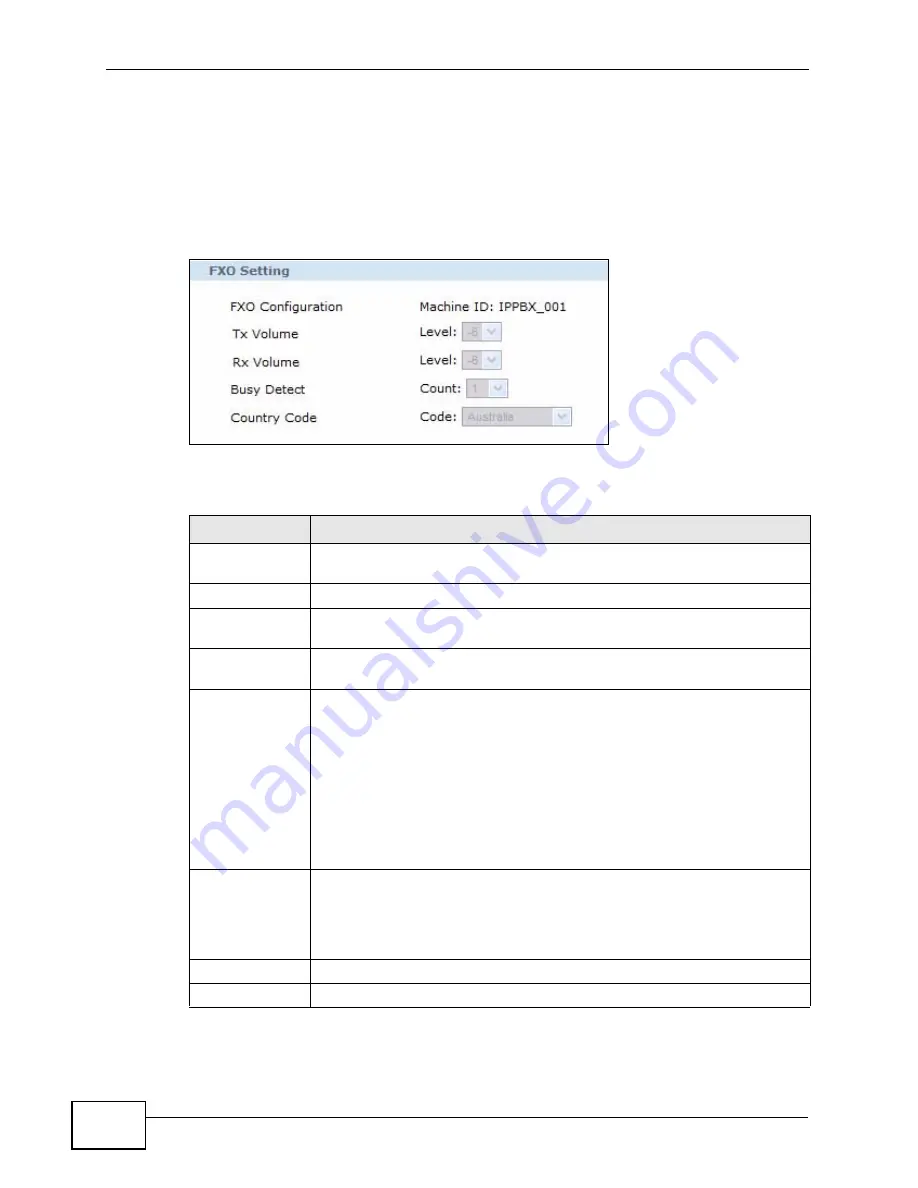
Chapter 6 Server
X2002 User’s Guide
132
6.3 The FXO Screen
Use this screen to configure settings related to the FXO lines configured on the
X2002. To access this screen, click
Configuration
>
PBX
>
Server
Configuration
>
Server
>
FXO
.
Figure 55
Server > FXO
Each field is described in the following table.
Table 22
Server > FXO
LABEL
DESCRIPTION
FXO Setting
Use these fields to specify the FXO interface which you want to
configure.
Machine ID
Indicates the X2002 for which you want to configure FXO settings.
Tx Volume
Select the volume level transmitted from the X2002. -6 is the quietest,
and 1 is the loudest.
Rx Volume
Select the volume level transmitted to the X2002. -6 is the quietest,
and 6 is the loudest.
Busy Detect
The X2002 listens for a tone to detect if an FXO line has been hung up.
This tone differs by region and it may also differ slightly between
carriers. In some cases the X2002 may mistake background noise for a
busy line signal.
This setting defines the number of busy tones the X2002 needs to
recognize before actually considering the line to be busy.
You should select a low value, if you have a good connection. Select a
higher value, if your FXO connection is of lower quality to avoid false
hang-ups.
Country Code
The signals used to indicate a busy line or an available line differ by
country. You must select the country code for the location of the X2002.
The X2002 can then recognize whether the FXO line is in use or
available. Select
default
to reset the country code value to the factory
defaults.
Apply
Click this to save your changes.
Reset
Click this to set every field in this screen to its last-saved value.
Summary of Contents for X2002
Page 2: ......
Page 24: ...Table of Contents X2002 User s Guide 24...
Page 25: ...25 PART I User s Guide...
Page 26: ...26...
Page 40: ...Chapter 2 How It Works X2002 User s Guide 40...
Page 99: ...99 PART II Technical Reference...
Page 100: ...100...
Page 124: ...Chapter 5 Network Deployment X2002 User s Guide 124...
Page 166: ...Chapter 7 Auto Provision X2002 User s Guide 166...
Page 170: ...Chapter 8 QoS X2002 User s Guide 170...
Page 248: ...Chapter 16 Click To Talk Group X2002 User s Guide 248...
Page 252: ...Chapter 17 Group Access Code X2002 User s Guide 252...
Page 304: ...Chapter 19 Auto Attendant X2002 User s Guide 304...
Page 312: ...Chapter 20 LCR X2002 User s Guide 312...
Page 346: ...Chapter 22 Call Services X2002 User s Guide 346...
Page 380: ...Chapter 25 Status Observation X2002 User s Guide 380...
Page 402: ...Chapter 27 Call Detail Record CDR X2002 User s Guide 402...
Page 410: ...Chapter 28 ACD Logs X2002 User s Guide 410...
Page 416: ...Chapter 29 Administrator Accounts X2002 User s Guide 416...
Page 424: ...Chapter 30 Diagnostics X2002 User s Guide 424...
Page 426: ...Chapter 31 X2002 User s Guide 426...
Page 446: ...Chapter 32 Remote Management X2002 User s Guide 446...
Page 448: ...Chapter 33 TFTP Management X2002 User s Guide 448...
Page 462: ...Chapter 35 License Control X2002 User s Guide 462...
Page 482: ...Chapter 36 Web Portal X2002 User s Guide 482...
Page 508: ...Chapter 39 Product Specifications X2002 User s Guide 508...
Page 548: ...Appendix C Legal Information X2002 User s Guide 548...
Page 562: ...Index X2002 User s Guide 562...






























